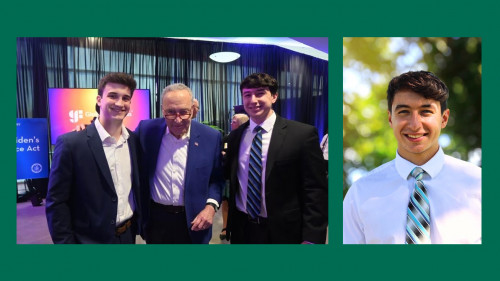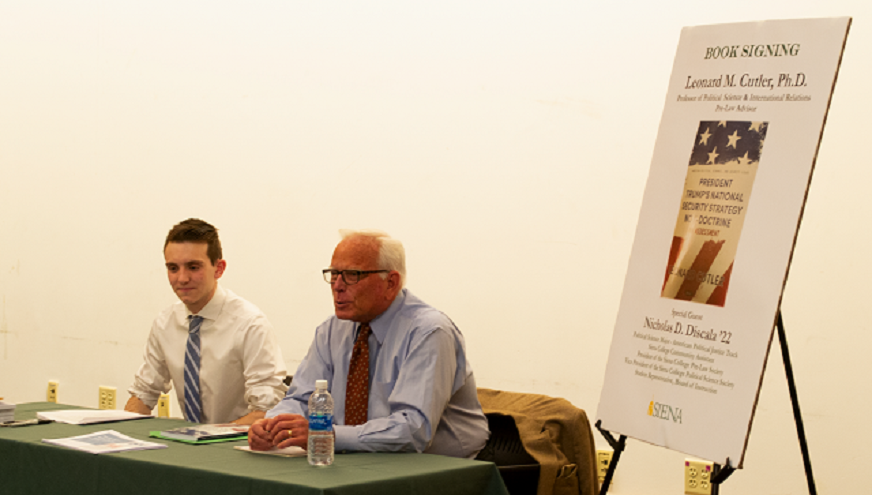

A faculty-student collaboration researching the role of Congress in national security has resulted in a new book.
Leonard Cutler, Ph.D., professor of political science, recently published President Trump’s National Security Strategy Non-Doctrine: An Assessment. He was assisted in his research by Nicholas Discala ’22, who worked as a CURCA scholar with Cutler for several years.
The book analyzes how President Donald Trump never developed a formal national security strategy or doctrine, but rather went from issue to issue without a detailed framework or plan.
“Trump used unpredictability and disruption to achieve his goals and objectives, with the principal objective being playing the game better, harder, and tougher while reducing the costs and risks for American global leadership,” said Cutler. “His national security approach promoted American sovereignty, military interests, and deals that advanced America first rather than reinforcing alliances that were of marginal value to our interests.”
The last chapter of the book is a coda examining the administrative transition from Trump to President Joe Biden.
Cutler and Discala presented on the topic at a conference in Boston in fall 2020, and held a book signing event for the Siena community back in March.
Cutler explained that Trump’s “transactional personalized approach” to other world leaders in many instances ignored American values and interests, which was clearly the case with respect to his relationships with Mohammed bin Salmad of Saudi Arabia, Kim Jong-Un of North Korea, Vladimir Putin of Russia, and even Sayyid Ali Hosseini Khamenei of Iran.
“His willingness to accept and embrace positions taken by foreign adversaries over those of his own national security team, allies abroad, or even allies in the Congress defined Trump’s approach to national security policy,” he said. “He preferred short term gains for himself rather than securing the long-term interests for the United States.”
In the book, Cutler also reflects on a personal conversation with H.R McMaster on the significance of the National Security Strategy Report of 2017, and the highly limited and questionable role that it played for the Trump administration. That conversation occurred when McMaster, former U.S. national security advisor, spoke to the Siena community in April 2020 at the invitation of President Chris Gibson ‘86, Ph.D.
McMaster said that he and his team developed a formal national security plan, which Trump opted to ignore.
“We wrote one, but Trump never followed it,” he told Cutler with a rueful laugh.
Cutler and Discala analyzed that Trump believed keeping allies and adversaries perpetually off balance accrued to the benefit of the United States.
“’America’ first and foremost meant that the president did not have to apologize for anything the United States did under his leadership, and he saw no adequate substitute for American power while insisting that our regional allies and coalitions bore a greater share of the burden in providing for the common defense,” said Cutler.
Discala, who will be attending Albany Law School this fall, said he hopes readers of the book will gain a more comprehensive look at certain legal and Constitutional nuances that are guiding and affecting the country’s national security apparatus and its decision makers.
“Foreign policy is not always at the forefront of voters’ minds,” he said, “but it’s a very important part of the legislative portfolio, particularly regarding our response to the invasion of Ukraine and other geopolitical threats. Better understanding of national security issues leads to more informed voters, who make better decisions about political candidates.”
Discala said he is grateful to Siena as a liberal arts college and the CURCA program specifically for the opportunity to work so closely with Cutler.
“It was an amazing experience as an undergraduate to conduct research directly with my mentor,” he said. “Siena offered many excellent opportunities such as attending and presenting at conferences and publishing this book as well as in peer reviewed journals. That’s not something many undergraduate institutions make available to their students.”

